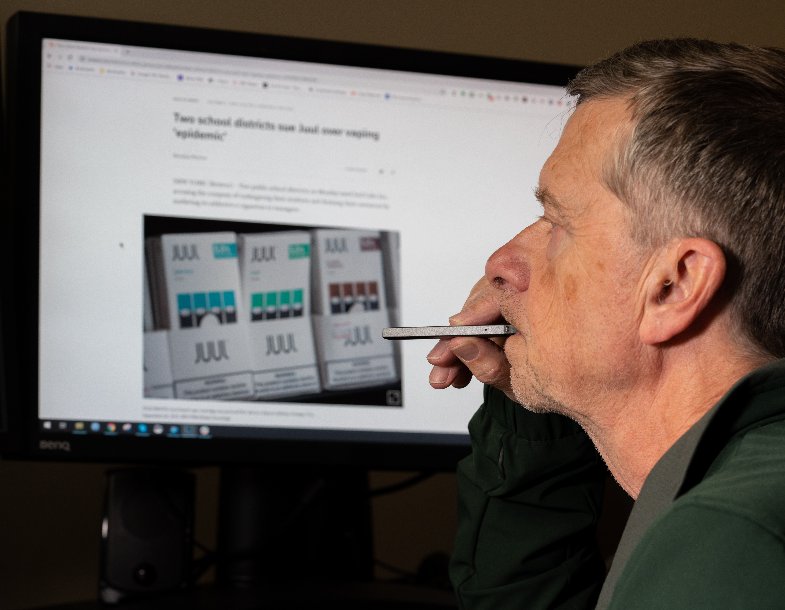
On June 23, 2022, the FDA ordered JUUL Labs Inc. to stop selling and distributing its products in the US. After reviewing the company’s PMTAs (premarket tobacco product applications), the FDA concluded the applications did not have sufficient evidence the Juul products would benefit public health, as claimed. Some of the company’s study findings had insufficient and conflicting data—“including regarding genotoxicity and potentially harmful chemicals” leaking from their e-liquid pods. The FDA Commissioner said, “Today’s action is further progress on the FDA’s commitment to ensuring that all e-cigarette and electronic nicotine delivery system products currently being marketed to consumers meet our public health standards.”
The FDA thought Juul’s application left regulators with questions about the chemical makeup of its vaping formulations, while Juul thought it submitted enough information and data to address all the concerns. The acting director of the FDA’s Center for Tobacco Products said,
As with all manufacturers, JUUL had the opportunity to provide evidence demonstrating that the marketing of their products meets these standards. However, the company did not provide that evidence and instead left us with significant questions. Without the data needed to determine relevant health risks, the FDA is issuing these marketing denial orders.
The next day the U.S. Court of Appeals placed a temporary hold on the ban, saying Juul’s application warranted “additional review.” Then the FDA announced on Twitter it would allow Juul’s vaping products to remain on the market while it reviewed the application for “scientific issues” unique to the Juul application.
The NYT said the decision to conduct an internal review moved the dispute out of the public eye of the appellate court and returned it to the agency’s private administrative process. The ban in June was celebrated by critics who thought the company should be held accountable for luring teenagers to use its flavored products. Others were critical, saying e-cigarettes are less toxic than traditional cigarettes. Juul argued that it had helped two million adult smokers quit traditional cigarettes. The company also said it had been singled out by members of Congress who influenced the agency to make the ruling.
Juul’s court filing said the agency contended “in more than two dozen places” that Juul did not provide enough data on four chemicals. But Juul said it did provide the data—6,000 pages of data. “Had F.D.A. done a more thorough review (like it did for other applicants), it would have seen data showing that those chemicals are not observable in the aerosol that Juul users inhale.”
Theodore Wagener, the director of the Ohio State University Center for Tobacco Research, said the original ban was surprising, given that independent research teams like his own found that Juul devices were far less toxic than traditional cigarettes. He said Juul aerosol has significantly lower-level and fewer toxicants than cigarettes; and lower chemical levels than other e-cigarettes. It seemed thing were beginning to go Juul’s way, and perhaps was a foreshadowing of the FDA decision.
Then on September 6th Juul agreed to pay $438.5 million to settle a two-year investigation by 33 states into the marketing and sales practices they blamed for starting a national flood in teen vaping. The company did not acknowledge any wrongdoing in the settlement, but said it was trying to resolve past issues while it awaited the FDA decision on whether it would be allowed to continue to sell its products. Connecticut’s attorney general said they were under no illusions that it will stop teen vaping. “But we have essentially taken a big chunk out of what was once a market leader.”
Juul said the settlement aligned with its current business practices. “We remain focused on the future as we work to fulfill our mission to transition adult smokers away from cigarettes — the No. 1 cause of preventable death — while combating underage use.” Under pressure for it marketing practices of targeting youth, Juul revised its business practices and target audience to adult smokers in the fall of 2018. See “Not JUULing Around” and “The Armageddon of Juul.”
The agreement does not resolve all of the company’s legal battles. While Juul had previously reached settlements in lawsuits brought by attorneys general from North Carolina, Washington, Louisiana and Arizona, nine similar cases remain. Major lawsuits filed by New York and California are among those still pending. And about 3,600 lawsuits by individuals, school districts and local governments, have been consolidated in an action that is still wending its way through a California court.
A study done in 2018 and published in the journal Pediatrics looked at 4207 students in ninth-through 12-grades in the Pittsburgh Public Schools. The researchers showed an inverse correlation between protective factors, such as parental monitoring and future orientation and youth vaping. “The differential association of protective factors across tobacco products highlights the unique social and relational features of vaping.”
One of the study’s authors, Kar-Hai Chu, has been studying the evolution of e-cigarettes for the past ten years. He said his research team has done several studies on Juul’s presence on social media, finding at least 25% of Juul’s Twitter followers were under 18. He said their estimate was conservative, as the recent settlement noted above found the number could be as high as 50%.
The immediate and obvious concern was that so many adolescents were being exposed to Juul’s advertisements, but as behavioral scientists, we realized the problems didn’t end there. Not only were kids seeing the ads, but they were sharing them with their friends. In the world of Facebook, Twitter, and Instagram, sharing tobacco content was as easy as a single click.
He described how on Instagram they saw many different flavors of Juul products in colorful cartons. “Decades of research have found that colorful tobacco images are more appealing to younger teens; Instagram was just the latest platform for this strategy.” He then noted a post that made them laugh: “Why do people pee in the Juul room?” But there was truth behind the humor. For teachers and school officials that Twitter post defined the battles they were having.
Kids were using Juul devices in schools, in bathrooms (or Juul rooms), and even in classrooms when teachers’ backs were turned. Schools were desperate for solutions. School administrators had watched adolescent cigarette use decline over the past decade, but this was something new. Yes, it was still a tobacco product, but kids didn’t seem to understand the health impacts. These weren’t teens rebelling by using cigarettes, knowing they were harmful; instead, it was athletes, A-students, and others who believed that e-cigarettes were merely flavored vapor with no impact on their health.
But the golden days for Juul have faded. After Juul gave in to public pressure and stopped selling flavors that appealed to young people, it fell to the fourth favorite among students. Puff Bar, with its candy-and fruit-flavored vapes was first. Altria in December of 2018 bought a 35 percent share of Juul (See “Not JUULing Around”). In a recent filing to its investors, Altria said its share was now valued at $450 million.
Whatever the FDA decision is on Juul, the FDA is purposefully moving to regulate all vaping, all ENDS (electronic nicotine delivery systems). But vaping manufacturers won’t give up without a fight. In an attempt to evade FDA regulation, manufacturers of e-cigarette brands popular with kids have begun to use synthetic nicotine in their products.
However, a new federal law went into effect in April of 2022, clarifying the FDA’s authority to regulate tobacco products containing nicotine from any source. After July 13, 2022, “any new non-tobacco nicotine product that has not received premarket authorization from FDA cannot be legally marketed.” When companies are found to be illegally marketing non-tobacco nicotine products, the FDA will first issue warning letters to achieve voluntary compliance. But the agency will pursue enforcement actions such as civil money penalties, injunction, non-tobacco sales orders, or injunction.





